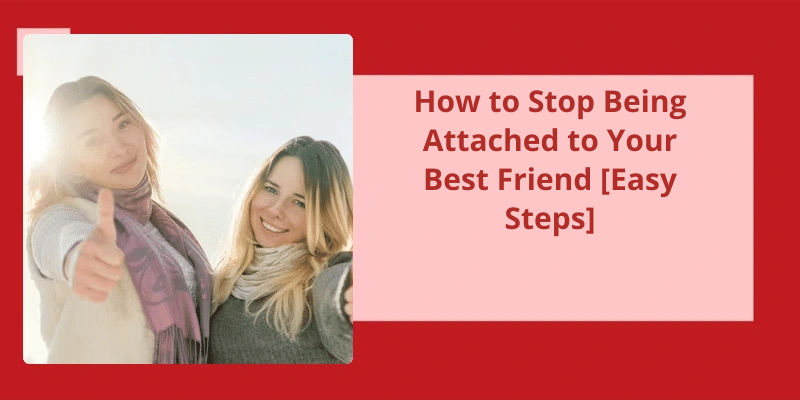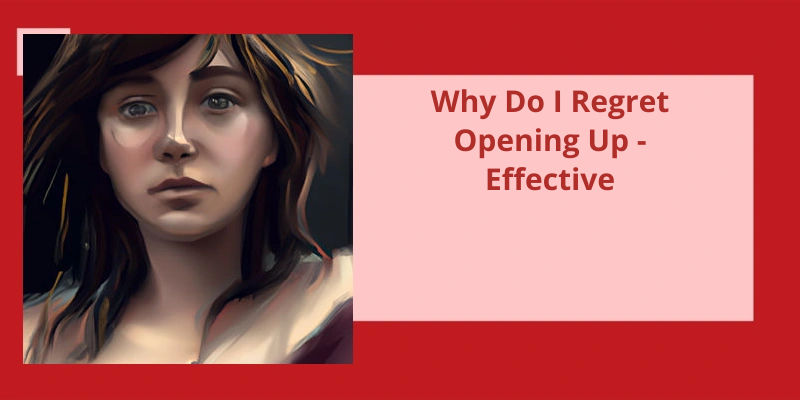Human beings are social creatures and we place a great deal of importance on our relationships with others. Our closest friends are often the ones who understand us the best, support us during tough times, and share the moments of joy with us as well. However, at times these relationships can become too intense or unbalanced, leading to difficulties that can even strain the friendship itself. Attachment to our best friends is one such challenge that arises and it can sometimes harm us in the long run. Being too reliant on your friend for emotional support, giving them too much power in your life and becoming clingy can make the relationship overwhelming for both of you. In this article, we will delve into ways to overcome the challenge of attachment to our best friends by understanding the root causes, overcoming clinginess, creating a fulfilling life and diversifying social circles.
Is It Normal to Love Your Best Friend So Much?
The bond between two friends can be incredibly strong and intimate. When you spend a lot of time with someone, it’s only natural for feelings of love and affection to develop. Whether it’s a platonic or romantic love, it’s entirely normal to love your best friend so much. However, it can be challenging to navigate these feelings, especially if you’re unsure if your friend feels the same way.
If you find yourself developing romantic feelings towards your best friend, it’s essential to take a step back and evaluate your emotions. It’s essential to understand that these feelings are valid and shouldn’t be dismissed, but it’s also crucial to respect your friends feelings. Communicating with your friend openly and honestly about your feelings is a significant first step. If they don’t feel the same way, it’s important to respect their boundaries and avoid putting pressure on them.
Entering into a romantic relationship with your best friend can be a healthy and fulfilling experience. However, it’s essential to acknowledge that this shift in dynamics can alter the friendship dynamic. It’s crucial to have open and honest communication about expectations and boundaries to ensure that the relationship operates smoothly. Nonetheless, if you both choose to give it a try, it can be incredibly rewarding.
It’s essential to respect each others feelings, communicate openly and honestly, and understand the potential dynamic changes that can come with pursuing a romantic relationship. Ultimately, the decision to give a romantic relationship a chance or preserve a platonic love is entirely up to you and your friend.
Breaking free from a clingy friend can be a delicate matter, as you don’t want to hurt their feelings or damage the friendship. However, it’s important to set boundaries and find ways to loosen the tight grip they may have on your social life. One effective way to detach from a clingy friend is to introduce them to new people and encourage them to branch out. By building a larger social circle, your friend may become less dependent on your company and start to appreciate other relationships in their life.
How Do You Detach From a Clingy Friend?
Having a clingy friend can be tough, but it’s important to remember that it’s not their fault. They may be going through a difficult time in their life or have attachment issues, and it’s crucial to handle the situation with empathy. However, it’s also essential to set healthy boundaries to maintain a healthy relationship.
One way to detach from a clingy friend is to introduce them to new people. Consider inviting them to social events and hang out together in larger groups. This allows them to meet new people and make new connections, which can help them become less dependent on you.
It’s also important to involve your other friends. Ask them to spend more time with your clingy friend and include them in social gatherings. This approach can help to create a more balanced social dynamic and ensure that your friend isn’t only relying on you for companionship.
Tell them if you’re busy and cant hang out, and gently suggest that they meet with other people who you both know. It’s important to be firm but compassionate in your approach.
You can also try to redirect their attention. Suggest activities or hobbies that they might enjoy and encourage them to explore their interests. This gives them an opportunity to find new ways to spend their time and gain fulfillment beyond their friendship with you.
How to Have a Conversation With a Clingy Friend About Boundaries
To have a conversation with a clingy friend about boundaries, it’s important to approach the situation with empathy and understanding. Start by expressing your appreciation for their friendship but also share your feelings about the need for space and boundaries. Be clear and firm in your communication, but also be willing to listen to their perspective and find a compromise that works for both of you.
As humans, we all crave love and connection in our lives. However, some individuals may find themselves becoming overly attached to one person. This behavior can stem from various reasons, including having an anxious attachment style or low self-esteem. In this article, we will explore the reasons behind getting attached and ways to overcome this behavior.
Why Do I Get Overly Attached to One Person?
At the core of feeling overly attached to one person is the fear of losing them. People with anxious attachment often feel like they need someone else to feel complete, safe, and secure. This can stem from past experiences of emotional abandonment, neglect, or rejection. In childhood, if a caregiver wasnt emotionally available or present, a child may develop an attachment style that’s anxious or preoccupied.
When an anxious attachment style is present, it can lead to a cycle of seeking validation and reassurance from others. They may experience intense feelings of jealousy or insecurity, often leading to relationship problems. This cyclical pattern of over-attachment can lead to poor relationship satisfaction and even breakups.
This can involve practicing self-compassion, setting boundaries, and building self-esteem. Exploring past traumas or seeking therapy can also be helpful in understanding how to change old patterns of thoughts and behaviors. It’s important to remember that it’s possible to create and maintain healthy, fulfilling relationships without relying on a partner for validation and security.
Another important aspect of managing attachment style is communication. Communicating with a partner about your feelings and desires can be challenging but productive. Expressing vulnerability and working through feelings of insecurity can help build trust and deepen bonds. Learning how to balance independence and interdependence in a relationship is also essential. It’s important to have separate identities and interests while also maintaining a strong emotional connection with a partner.
Having a healthy attachment in friendships is essential to building strong and lasting relationships. When someone has a secure attachment style, it allows for open communication, dependability, and a mutual respect for boundaries. In the next section, we will discuss the benefits of maintaining a healthy attachment in friendships and strategies for cultivating these types of relationships.
What Is Healthy Attachment in Friendships?
They respect their friends” boundaries and are comfortable setting their own. This type of person is capable of being vulnerable with their friends and encourages their friends to do the same. They don’t shy away from conflict when it arises, but address issues in a respectful and constructive manner. They’re able to evolve and grow within their friendships and welcome growth in their friends as well.
On the other hand, a person with an anxious attachment style may struggle with healthy attachment in friendships. They may have a hard time trusting their friends and doubt their loyalty. This may lead to clinginess and an over-dependence on their friendships for emotional support. They may also struggle with boundaries, either invading their friends” boundaries or setting none for themselves. This can lead to a lot of misunderstandings and damaged relationships.
They may struggle with expressing their emotions and may be uncomfortable with the vulnerability that comes with close friendships. They may prioritize their independence over their friendships, which can lead to distance and a lack of intimacy. They may also have a hard time accepting support from their friends, leading to a one-sided relationship.
Overall, healthy attachment in friendships involves open communication, support, respect for boundaries, vulnerability, and growth. It takes effort and intentionality from both parties to maintain this type of friendship, but it’s worth it for the benefits of a supportive and nourishing relationship.
How to Develop Healthy Boundaries in Friendships
Developing healthy boundaries in friendships involves setting clear and respectful limits on the behaviors and actions that you’ll and won’t allow in your friendships. This can include speaking up when you feel uncomfortable or disrespected, being honest about your feelings and needs, and understanding and respecting the boundaries of others. By establishing healthy boundaries, you can build stronger, more meaningful relationships with your friends while also protecting your own emotional and mental wellbeing.
Source: How Attachment Style Shows Up In Friendships
It’s important to understand that while attachment to friends can provide a strong support system, it can become harmful if it turns into dependence. Relying too heavily on others to meet emotional needs can lead to a toxic attachment. To ensure a healthy emotional attachment, it’s crucial to find a balance between self-reliance and reliance on others. It’s recommended to seek the guidance of a supportive therapist who can help with anxiety and other emotional issues.
Can You Become Too Attached to a Friend?
The concept of attachment has been studied for many years in relation to human and animal behavior. Attachment is a natural emotional bond that develops between individuals. Attachment becomes toxic when we become too dependent on others for emotional stability and support. When there’s an over-reliance on someone else for emotional support, this person becomes the primary source of our happiness. Over-attachment to a friend can be unhealthy and can lead to dependency, co-dependency, and emotional issues.
When you become too attached to a friend, there can be a tendency to neglect other aspects of your life and relationships. Friends and family members might take a back seat to this one particular relationship. This can lead to a feeling of isolation and loneliness when the relationship ends or the friend isn’t available. It’s crucial to maintain boundaries in a friendship so that the relationship remains balanced.
Self-awareness is essential in any relationship, particularly when there’s a strong attachment to a friend. Understanding and expressing your own needs helps cultivate healthy relationships. If your friendship is becoming problematic, speaking to a supportive therapist can help alleviate anxiety and stress. A therapist can provide guidance and support in identifying problematic patterns.
It’s important to recognize when a friendship is healthy or not. Friendship should be supportive, motivating, and empowering. A healthy relationship should make us feel better about ourselves, be affirming, and non-judgmental. Unhealthy relationships can leave us feeling drained, anxious, and unsupported.
The goal of healthy emotional attachment is to find a balance between self-sufficiency and companionship. If you feel that your attachment to a friend is becoming problematic, it’s essential to seek the support and guidance of a therapist. Therapists can provide tools to promote self-awareness and identify patterns of behavior that may be damaging for your emotional well-being.
Signs of an Unhealthy Attachment to a Friend
- You experience jealousy or possessiveness when your friend spends time with others
- You constantly need approval and validation from your friend
- You prioritize your friend over everyone else in your life, including yourself
- You become anxious or upset when your friend doesn’t respond to your messages or calls right away
- You ignore red flags or negative behaviors from your friend because you’re afraid of losing them
- You lose sight of your own values and beliefs in order to please your friend
- You feel like you can’t be happy or successful without your friend’s support and approval
- You become overly emotional or dramatic when your friend doesn’t meet your expectations
- You feel like your friend is the only person who truly understands you and you can’t function without them
- You become defensive or angry when someone tries to point out that your attachment to your friend may be unhealthy
As a friend, it’s important to maintain a healthy balance of communication and respect for each other’s space. It’s possible that your clinginess may be affecting your friend in ways you may not have noticed, and it’s important to address these concerns before it’s too late. Here are some signs to look out for if you think you may be too clingy with your friend.
Am I Being Too Clingy to My Friend?
It’s important to remember that your friend needs their own space and independence too. They’ve their own life and obligations to tend to, which may require them to prioritize other things over hanging out with you. Dont take it personally if they arent always available to chat or hang out. This doesn’t mean they don’t care about you or value your friendship.
If youre constantly texting or calling your friend and expecting an immediate response, it’s important to step back and evaluate if this behavior is reasonable. It’s okay to check in on your friend and see how theyre doing, but it’s important to respect their time and boundaries. If they don’t respond right away, don’t bombard them with more messages or assume the worst.
It’s also important to consider if your clinginess is coming from a place of insecurity or anxiety. Perhaps youre dealing with your own personal issues or feeling lonely, and clinginess is a way to cope with these feelings. It’s important to address these underlying issues and find healthier ways to deal with them. Therapy or seeking support from loved ones can be helpful in this process.
Overall, the key to maintaining a healthy friendship is balance and respect. Allow your friend to have their own life and space while still cherishing the time you spend together. Talk openly and honestly with them about your feelings and make sure to listen to their perspective as well. Remember that true friendship is built on mutual trust, understanding, and support.
Conclusion
In conclusion, breaking free from an attachment to a best friend can be a challenging task, but it isn’t impossible. By following the strategies mentioned above such as understanding your attachment style, respecting boundaries, and establishing your own, you can gradually work towards creating a healthier and more balanced relationship with your friend. It’s essential to focus on creating an inspiring life that isn’t solely dependent on your best friend and to diversify your social groups. By understanding and addressing the root cause of your clinginess, you can start to overcome the tendency to idolize your friends and learn to let people feel free. Ultimately, it’s about finding a balance between cherishing your relationship with your best friend and allowing space for them to live their own life.






